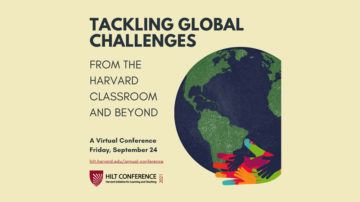From Harvard Magazine:
 “WORRYING SEEMS ABOUT as necessary as breathing these days,” President Lawrence J. Bacow remarked last Friday in his address at the tenth annual Harvard Initiative for Learning and Teaching (HILT) conference. “Global challenges abound, and efforts to address them will have to be based in deep considerations of equity and justice, of community and humanity. How do we prepare our students to undertake that work? How can we do a better job as teachers, as scholars, as leaders, of putting our own work in as broad a context as possible?” These questions opened the conference, this year titled “Tackling Global Challenges from the Harvard Classroom and Beyond” and attended by more than 300 Harvard faculty members and academic leaders. The conference is designed to create a University-wide dialogue about teaching and learning innovation among Harvard’s professors, senior leaders, academic professionals, and students. (Read about the 2020 conference here.)
“WORRYING SEEMS ABOUT as necessary as breathing these days,” President Lawrence J. Bacow remarked last Friday in his address at the tenth annual Harvard Initiative for Learning and Teaching (HILT) conference. “Global challenges abound, and efforts to address them will have to be based in deep considerations of equity and justice, of community and humanity. How do we prepare our students to undertake that work? How can we do a better job as teachers, as scholars, as leaders, of putting our own work in as broad a context as possible?” These questions opened the conference, this year titled “Tackling Global Challenges from the Harvard Classroom and Beyond” and attended by more than 300 Harvard faculty members and academic leaders. The conference is designed to create a University-wide dialogue about teaching and learning innovation among Harvard’s professors, senior leaders, academic professionals, and students. (Read about the 2020 conference here.)
This year’s event—again conducted virtually via Zoom—encouraged Harvard educators to reflect on their experience teaching remotely during a pandemic that “exacerbated issues” like social and healthcare inequality “that have existed in society for many, many years,” said panelist and senior lecturer in molecular and cellular biology Alain Viel. Undergraduate courses have returned to in-person instruction, but “We can’t ignore what happened during the last 17 months,” said Bharat N. Anand, vice provost for advances in learning. Those 17 months—marked by the pandemic, remote teaching, protests against systemic racism and police brutality, and economic hardship for millions of people—made it clear to educators that their students will enter a changed world after graduation.
Graduate School of Education (HGSE) dean Bridget Terry Long noted that as students spread around the world into a wide variety of communities, Harvard was no longer “far removed in Cambridge in the ivory tower.” With both the state of the world and the global reach of remote teaching in mind, the conference posed one central question: “How can we best prepare students to address global challenges in thoughtful and creative ways?”
More here.
